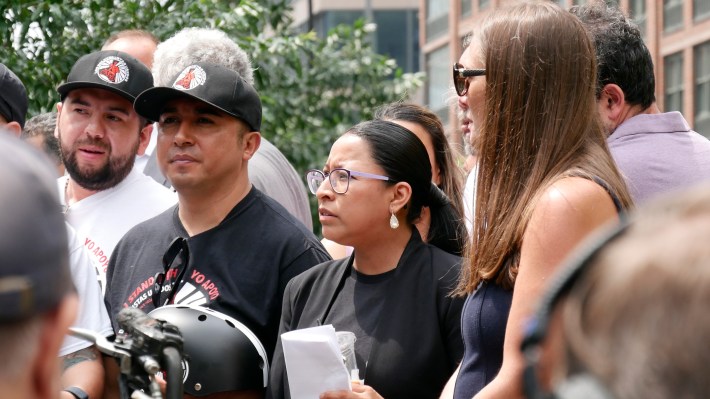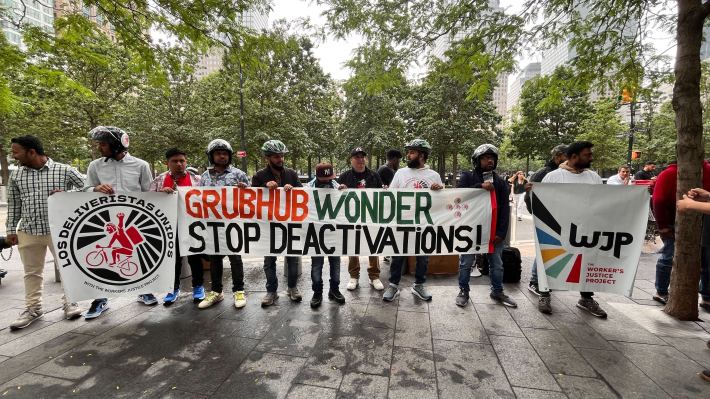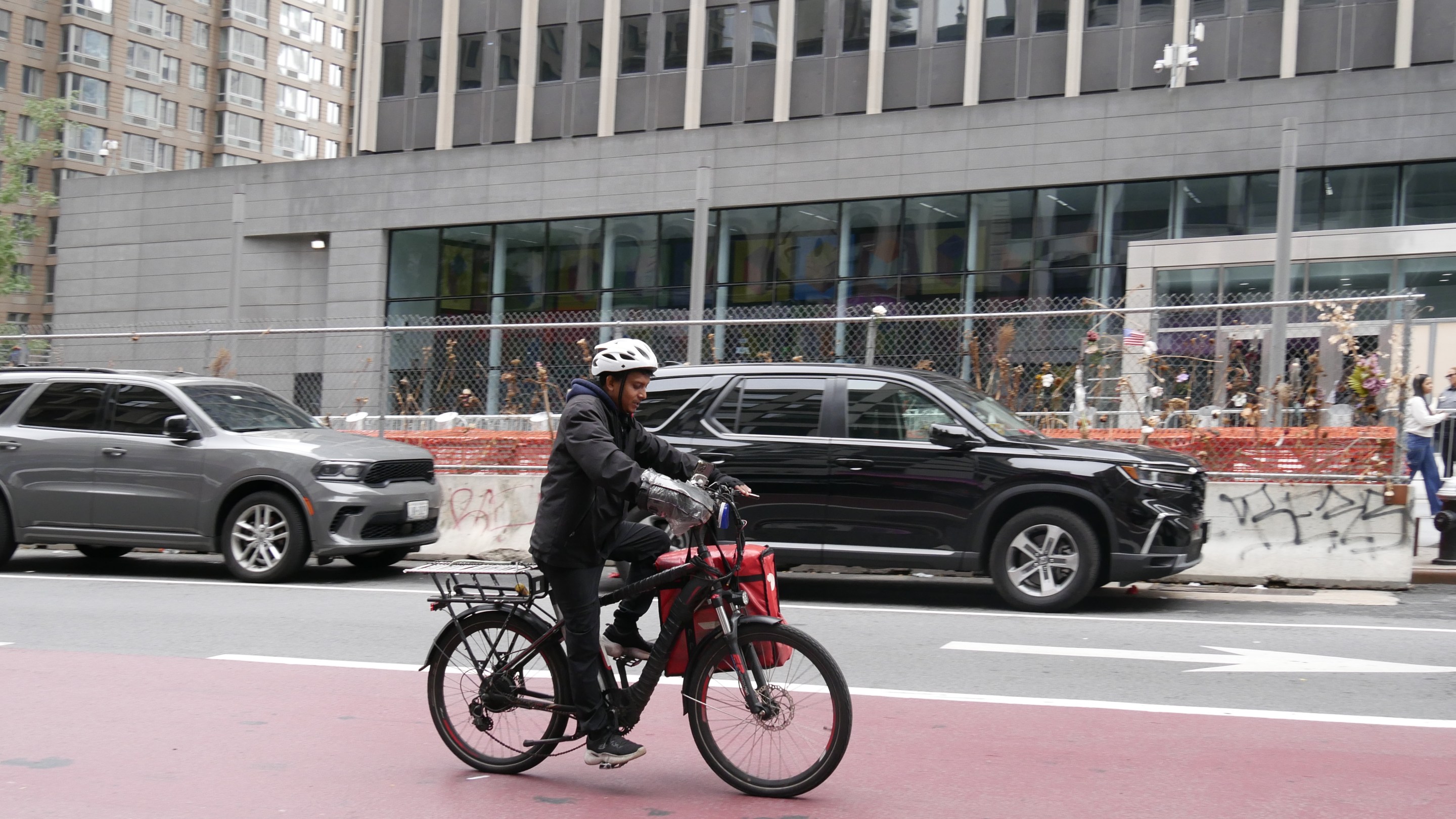Easy for them to say.
DoorDash has come out in support of the mayor's new 15-mile-per-hour speed limit for e-bikes, but declined to answer questions about whether the company will adjust its algorhithm to give workers more time to get from place to place.
Delivery workers who use e-bikes to deliver food, groceries, and other goods across the five boroughs want the app companies to stop incentivizing speed at the expense of safety — and they'd prefer more regulation on the apps rather than punitive measures on workers, like the new speed limit.
DoorDash's position makes all the sense in the world ... for the company, which is a large political donor that treats its workers as "independent contractors." Of course it publicly announces support for a speed limit — the tickets will be paid by their workers. The company also supports the legislative push to ban Class 3 e-bikes — which also makes complete sense from a business perspective: the company calls such 25-mile-per-hour bikes dangerous, even though they are the most popular vehicle with delivery workers.
“Most Dashers follow the rules of the road and do the right thing. However, we recognize community concerns about safe riding. In a city as dense and dynamic as New York, setting a lower speed limit for e-bikes is a smart and sensible step. That’s why we are supportive of the city’s new policy of a 15 mph speed limit for e-bikes,” reads the company’s blog post.
But the company, along with the other major players, said nothing about its consistent pattern of prioritizing speed over safety. As such, supporters of the dignity of labor objected.
“The hypocrisy of [the app companies] is that they publicly always say that they do care, because they depend on goodwill and marketing themselves as responsible companies. But the reality is, this administration is ... only holding accountable the e-bike rider that is operating in a system that they cannot control,” Ligia Guallpa, the executive director of Worker’s Justice Project, which includes Los Deliveristas Unidos.

The company would not say whether it was educating its workers about the new speed limit, or if it would be adjusting its algorithms to reflect the reduced speed.
Yes on speed limits, no on deactivation protections
Guallpa said that her organization has filed a thousand appeals with the major app companies – GrubHub, UberEats, and DoorDash – because workers are getting kicked off the app, or “deactivated,” without due process.
Los Deliveristas Unidos has been pushing for a City Council bill, Intro 1332 from Council Member Justin Brannan (D-Bay Ridge), which they argue would actually make a difference in street safety, considering the main reason workers give for rushing on the streets is fear of deactivation. One of the reasons an app worker can be kicked off is failure to deliver food on time.
DoorDash denies this, saying that workers are “always given adequate time to complete an order, including buffers that factor in variables like traffic or weather conditions. They are never penalized for a single instance when it takes longer to complete an order than anticipated.”
But Guallpa called that "a complete lie" because delivery workers complain to her every day about this problem, which she says is pervasive across all apps.

“They do punish workers for not completing deliveries on a designated time, and the punishment happens in two ways. One is offering low ratings. And the other one is deactivating them out of the platform. So often the choice [deliveristas] face is to obey the new speed limit, or risk losing their job or risk criminal summons and possible deportation,” said Guallpa.
The app companies, which have fought city regulations at every turn, are fighting against the deactivation bill.
Other app companies have been less open than DoorDash about their position on the new speed limit. GrubHub, which is owned by Wonder Group, along with Seamless and Relay, would not say whether or not it supports the speed limit, or if it would change delivery times to reflect the new reality, but did say it was working to educate the riders about the new rule.
“The safety of our delivery partners and the communities they serve is a top priority, and we’re committed to being a responsible part of the city’s transportation ecosystem. We design our delivery experience with safety in mind — from setting realistic delivery times, to partnering with local officials on education and best practices, including providing the latest resources from the NYC Department of Transportation with our drivers,” said a spokesperson for the company.
Uber and Instacart did not respond to Streetsblog’s requests.
The limits of the limit
The speed limit has its practical issues. Lawyers and transportation professionals question how the city will be able to enforce a speed limit for just e-bikes, when the NYPD has consistently demonstrated an inability to tell the difference between different types of micro-mobility.
The mayor says the speed limit will “protect e-bike riders, pedestrians, and everyone who shares our streets.” But an e-bike rider will have to keep it to 15 miles per hour, but car drivers who don't follow the 25-mile-per-hour speed limit don't even trigger a speed cameras until the car hits 36 miles per hour — more than twice the speed of the fastest e-bike.
“This is really insane. This has all the hallmarks of a bad, poorly thought out, misbegotten emergency regulation and it’s just an invitation to profiling,” said Steve Vaccaro, a lawyer who represent victims of traffic crashes. “The most fundamental principle of traffic safety is homogenous grouping by speed. If you group things that have different speeds together, and there's a significant difference in speed, it creates traffic conflicts, it creates impatience, it creates road rage, and it creates safety hazards.”






